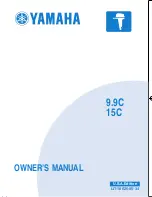
118
h’00000000
~
h’003FFFFF
EPROM area monitor
program
CS0 area
(bus width: 16bit)
h’00400000
~
h’007FFFFF
Debug LED area
h’00800000
~
h’00BFFFFF
Switch area
h’00C00000
~
h’00FFFFFF
Unused area
h’01000000
~
h’01FFFFFF
Flash memory area
h’02000000
~
h’03FFFFFF
Unused area
h’04000000
~
h’07FFFFFF
Board control register area
CS1 area
(bus width: 16bit)
h’08000000
~
h’0BFFFFFF
Extension area (CS2)
CS2 area
(bus width: arbitrary)
h’0C000000
~
h’0FFEFFFF
User area
CS3 area
SDRAM area
(bus width: 32bit)
h’0FFF0000
~
h’0FFFFFFF
Area used by the monitor
program
h’10000000
~
h’13FFFFFF
Extension area (CS4)
CS4 area
(bus width: arbitrary)
h’14000000
~
h’17FFFFFF
Extension area (CS5)
CS5 area
(bus width: arbitrary)
h’18000000
~
h’1BFFFFFF
PCMCIA area
CS6 area
(bus width: 16bit)
Figure 10.1 Memory Map (Real Memory Space)
(3) Monitor program start
Connect Solution Engine2 and the host system with an RS-232C cross cable. When the monitor program starts,
the following starting message appears on the host system screen.
In the above starting message, a version number is displayed in xx.
================================================
SH7760 Self Debugger
Ver x.xL
(****/**/**)
-----------------------------------------------------------------------------
(C) Copyright 2002-2005. Hitachi.Ltd. All rights reserved.
=================================================
H [elp] for help messages...
Ready >
Summary of Contents for SH7760 Solution Engine2
Page 3: ......













































